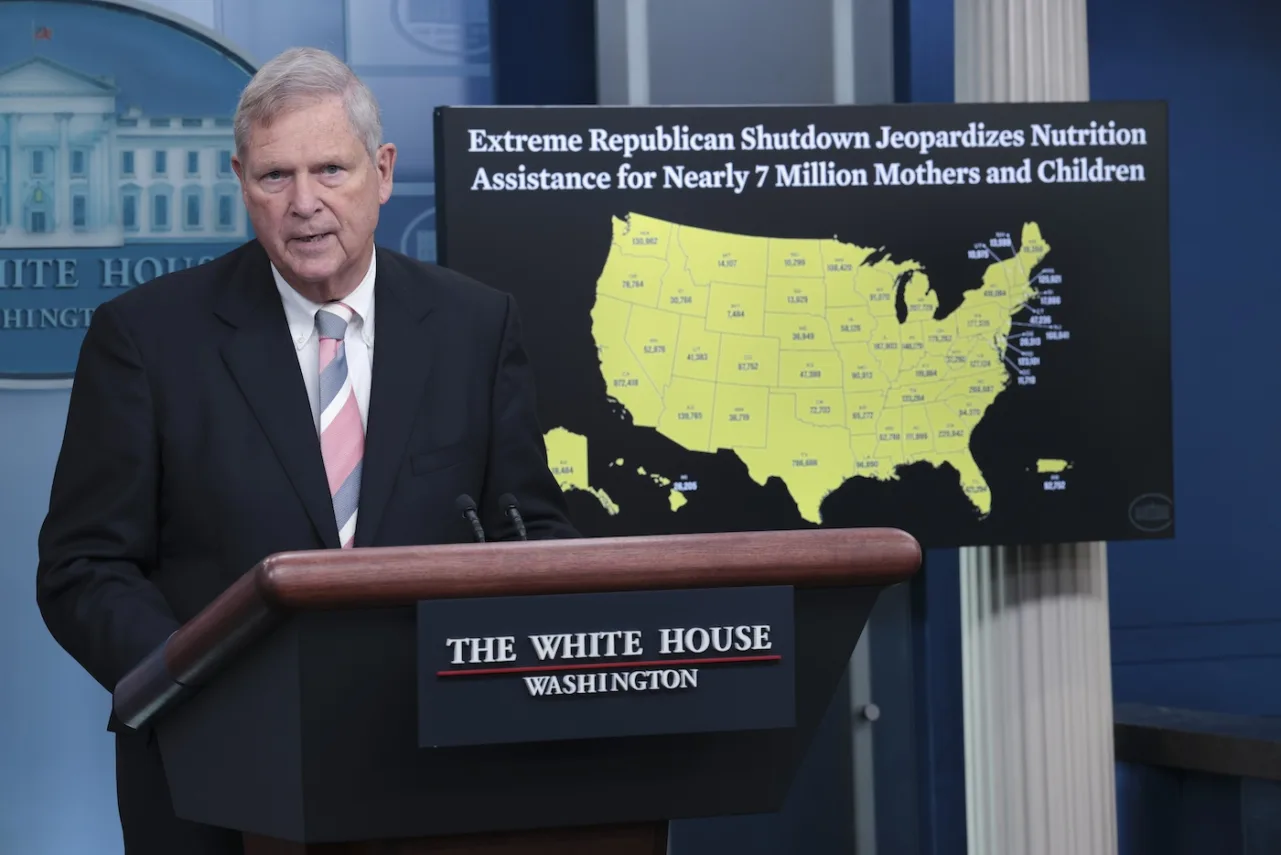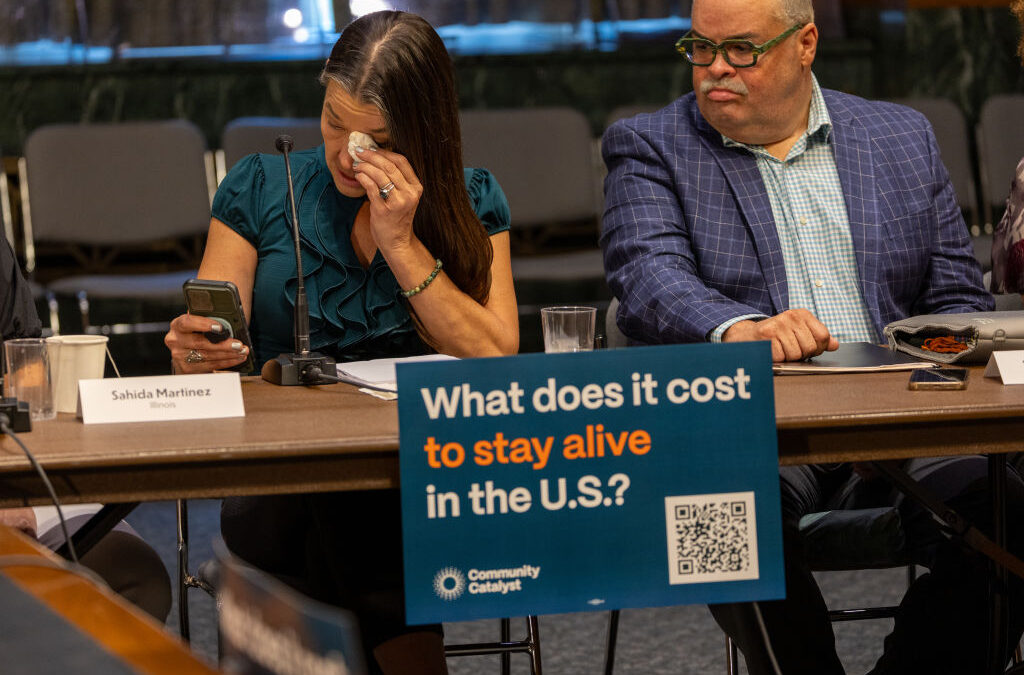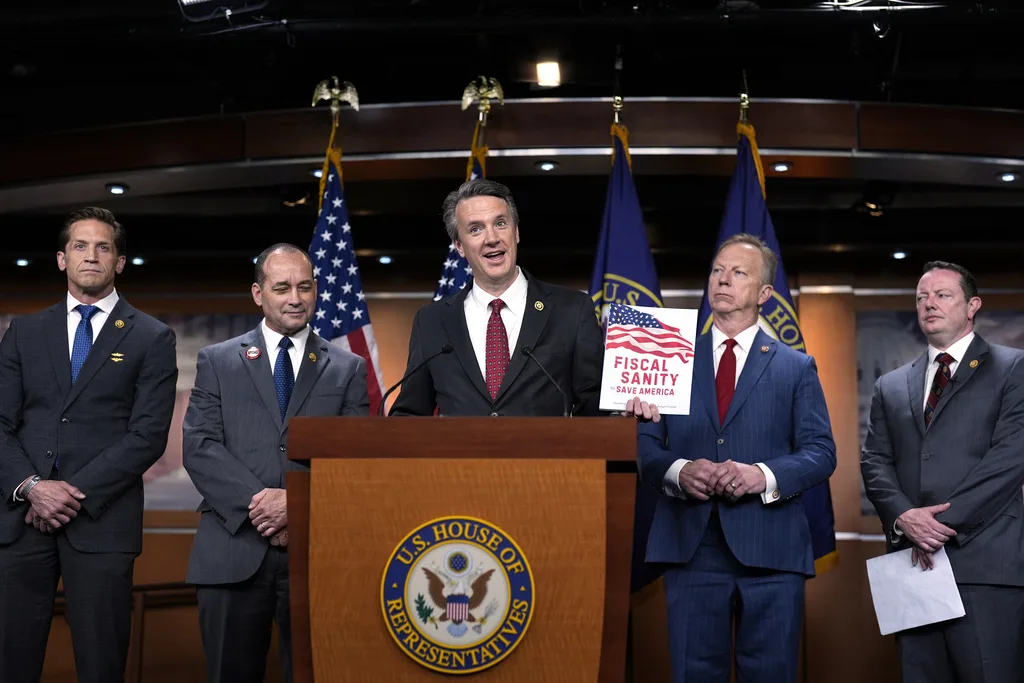
Secretary of Agriculture Tom Vilsack answers questions during the daily press briefing at the White House on September 25, 2023 in Washington, DC. Vilsack and White House press secretary Karine Jean-Pierre answered a range of questions related primarily to a potential shutdown of the U.S. government. (Photo by Win McNamee/Getty Images)
Congress can’t agree on a federal budget and their disagreements could hurt farmers, consumers, global trade, and the environment.
Farmers in Wisconsin and political candidates in the state’s 3rd Congressional District say a new Farm Bill has already been delayed too long by threats of a government shutdown and that Congress is missing an opportunity to improve investment in farm families, rural businesses, and better markets for consumers.
“Remind me why we pay these guys again?” asked Hans Breitenmoser, a Lincoln County dairy farmer. “They all still collect a paycheck and [are] getting health insurance as well. We need public policy to move us forward.”
Normally passed every five years, the current Farm Bill of 2018 is in overtime, delayed by a Democratic-controlled Senate trying to pass a federal budget and a Republican-controlled House of Representatives demanding significant spending cuts, despite the impact such cuts would have on families, farms, businesses, and global trade.
The Farm Bill is about so much more than farming. Because it’s a food bill, an export bill, an economic development bill, an infrastructure bill, and a conservation bill, every American feels its impact to some degree. According to a coalition of farmer and industry groups, the programs funded by the Farm Bill directly affect 46 million jobs in the country and more than 2 million farms, and provide more than 9 billion meals a year to 21 million American families through the Supplemental Nutrition Assistance Program (SNAP).
Producers like Breitenmoser, a member of the Wisconsin Farmers Union, want a new Farm Bill to improve crop insurance, modify price supports to keep farmers from going bankrupt, and address monopoly concerns as corporations in the food supply get larger and offer farmers lower prices for their crops but charge consumers higher prices..
“Many farmers are interested in having some sort of a supply management system that will take this rollercoaster out of the equation and also slow down the trend line that has us having fewer and fewer farms on the landscape and just having larger and larger farms,” Breitenmoser said.
But conservatives in Congress say their priority is reducing benefits for SNAP as well as the Women, Infants, and Children (WIC) program that helps lower-income families afford food and baby formula. Growth in these programs has become “unsustainable,” according to Sen. John Boozman (R-Arkansas), the top Republican on the Senate Agriculture Committee.
“When one program constitutes more than 80% of the spending in the next Farm Bill, and thereby effectively crowds out the ability to make crucial investments in every other title, is there really any room left for farmers in the traditional farm bill coalition?” Boozman said, despite no unalterable requirement that increased funding for food assistance requires cuts elsewhere.
Other Republicans have demanded $50 billion in cuts from the Farm Bill’s conservation programs.
Wisconsin Republican US Rep. Derrick Van Orden sits on the House Agriculture Committee and has held listening sessions about the Farm Bill, but Democratic candidates seeking to challenge him in the fall have criticized his lack of leadership on behalf of farm families.
“You’d think he’d get it, but we’re not actually seeing any movement or leadership from him on this issue,” said state Rep. Katrina Shankland (D-Stevens Point). “He’s in the majority and what has he done? He kicked the can down the road on a really important Farm Bill, and that’s something I’ve heard from a lot of farmers. They’re very worried and concerned about it.”
Eau Claire entrepreneur Rebecca Cooke said her own farm roots help her understand what Congress should be doing.
“We’ve seen Van Orden really get nothing done for working farm families, and that’s really frustrating,” Cooke said.
“They just aren’t focused on the people,” said candidate Eric Wilson of Eau Claire. “They are just creating dysfunction which is exactly what we don’t need and what we can’t afford. We need people who are going to listen, step up, work together, and figure out how we can move forward.”
Shankland, Cooke, and Wilson all spoke on UpNorthNews Radio between Jan. 31 and Feb. 2.
Any potential progress for a new Farm Bill remains on hold as the two parties fight over funding the government itself. Congress pushed the deadline of September 30, 2023 for a new Farm Bill to September 30, 2024—barely a month before the November elections. Some in Congress hope to get a deal done this spring in order to avoid trying to pass mammoth legislation in the middle of campaigning; others fear a lame duck session after the election might be required.
The Farm Bill also impacts how the nation addresses immigration concerns, a changing climate, health care, infrastructure, and small business support in parts of the country that are less populated, but essential for the US economy.
“These are issues that the Farm Bill addresses and having our elected policymakers do nothing because of the dysfunction is just really troubling, because life continues to move on out here in rural America,” Breitenmoser said.
“So much more could be done if we had a more functional Congress.”
Politics

Opinion: It’s time for Congress to fight for small businesses instead of big corporations
May is National Small Business Month. Our elected leaders need to show leadership all year long. For the past 27 years I’ve been fortunate to pursue...

Here’s what you need to know about medical debt in Wisconsin
Medical debt—a financial burden for tens of millions of Americans facing hundreds of billions of dollars in health care costs—affects everyone,...
Local News

Sip, sit, stay: 7 dog-friendly businesses in Eau Claire
When the sun’s out, everyone wants to be outside drinking and dining — including dogs! But not all establishments allow four-legged, furry visitors....

The 8 most convincing UFO sightings in Wisconsin history
If you’ve ever seen something light up in the sky and wondered what it could be, there’s a chance it’s a UFO, especially if you’re in Wisconsin. The...





